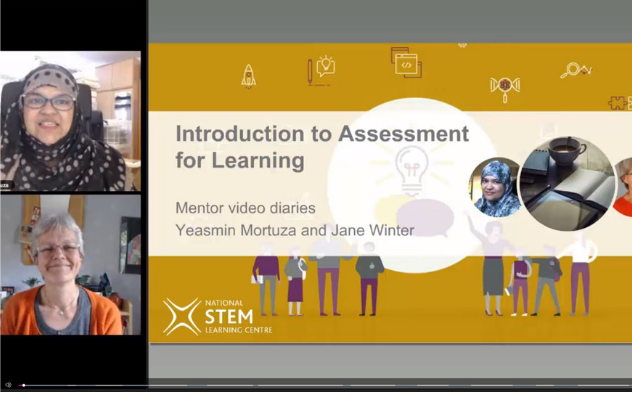Jane Winter and Yeasmin Mortuza are our experienced mentors for our free online courses on Assessment for Learning. Here, they share a highlight from the course discussions, captured as part of their course video diary.

Yeasmin and I have been enjoying working with participants on STEM Learning's Introducing Assessment for Learning online course. We recently recorded a video diary, which is our chance to review and discuss some of the comments made by participating teachers.
One of the comments that we particularly enjoyed and chose to discuss was from Gareth. When he joined the course he highlighted that he was already using a variety of methods to find out what his students understand:
“I would say my main strategies are Q&A, think/pair/share, [and] self-assessment, especially with mathematical content where I focus on a ‘process over product’ approach which allows the students to, hopefully, see where they went wrong.”
We loved Gareth’s phrase ‘process over product’; it is such an important element of Assessment for Learning. To illustrate this point, I shared an example from my own experience as an early years teacher. Sometimes, when sitting with a child who was painting, I would be more focussed on the finished painting (or product). I would suggest what colours the child used, point out how they could make their picture better and, at some point, whip the picture away before they could spoil it with more paint. When I did this, I not only missed lots of learning opportunities, I gave the child a subliminal message that their work was not good enough.
Fortunately, as I became a more experienced teacher, I learned that focussing on the finished product can actually get in the way of learning. When sitting with children who were painting I learned to let them explore the viscosity of the paint and how the colours mixed on the paper. I listened while they talked about what they were doing and I shared their surprise when the paper became soggy and disintegrated!
By focussing on what the child was learning rather than what they were producing I was able to support them to learn even more. Funnily enough, once I stopped focussing on the finished paintings, as well as learning a lot about the materials that they were using, the children naturally became more confident and proficient artists.
Yeasmin agreed that this holds true for older students too. If teachers focus on the process of teaching, make it their mission to find out what their students know and why they think what they do and, above all, to ENJOY the process of teaching, then the end product (such as exam results) will look after itself. On the other hand, when we focus on exam results they may actually not be so good in the long term.
As Yeasmin says in the video:
“With fast-paced learning, which is what ultimately it comes down to, we're building up relationships. They're building up their confidence. And we can actually just focus on the progress, which gets us to the end result faster anyway.”
